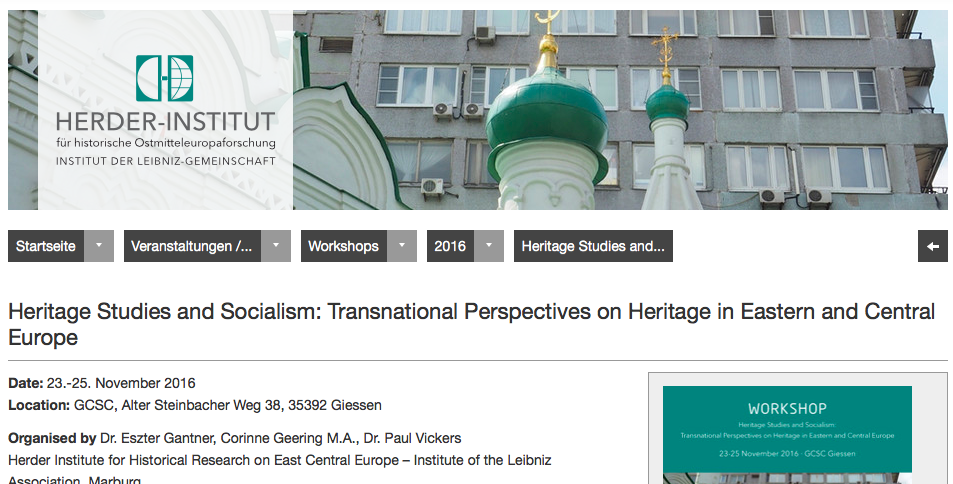
Heritage Studies and Socialism: Transnational Perspectives on Heritage in Eastern and Central Europe
Vom 23. bis 25. November 2016 fand am International Graduate Centre for the Study of Culture in Gießen der Workshop "Heritage Studies and Socialism: Transnational Perspectives on Heritage in Eastern and Central Europe" statt. Der Workshop widmete sich der Debatte um Konzepte der Temporalität, der Authentizität und der Originalität als Kernelemente der Heritage Studies. Der Fokus lag auf den sozialistisch geprägten Jahren in Zentral- und Osteuropa und brachte eine große Zahl Forscherinnen und Forscher aus diesem Gebiet zusammen. Der Workshop war in sieben Panels aufgeteilt: Socialist Interpretations of Heritage; Heritage Actors; Heritage and Communist Internationalism; International Organizations; The Revalorisation of Socialit Heritage; Urban Planning and the Historic City; Memory and Heritage.
Heritage studies as a cross-disciplinary understanding of material and immaterial culture are confronted with political, regional, and institutional frameworks which make comparison essential. The Workshop, organized by Eszter Gantner (Herder Institute Marburg), Corinne Geering and Paul Vickers (both International Graduate Centre for the Study of Culture, Giessen) and supported by the Leibniz Research Alliance “Historical Authenticity,” aimed to debate concepts of temporality, authenticity, and originality as core concepts of heritage and brought together scholars of heritage studies concerning Central and Eastern European countries during socialism. The question was raised by the organizers, whether a pre-1989 “socialist” interpretation of heritage would show common trajectories to integrate the diverse local and regional practices as well as national frameworks of heritage.
Den gesamten Tagungsbericht von Andreas Ludwig für H-Soz-Kult können Sie hier weiterlesen.
Conference Overview:
Astrid Swenson (Brunel University London): When is Heritage? Temporality and Transnational History (keynote lecture)
Panel 1: Socialist Interpretations of Heritage
Melinda Harlov (Eötvös Loránt University, Budapest): Vernacular Heritage in Hungary, a Category that Fitted to the Socialist Ideology
Nele-Hendrikje Lehmann (Freiberg University of Mining and Technology): Industrial Heritage in the GDR, 1949–1989
Panel 2: Heritage Actors
Bianka Trötschel-Daniels (Technical University of Dortmund): The ‘Heritage Council’ in the GDR
Alicja Gzowska (University of Warsaw): Socialist Fraternal Assistance or Commercial Success? International Activities of Polish State Workshops for the Conservation of Cultural Heritage
Olga Olkheft (European University St. Petersburg): “We are the Rare Place Where the ‘Iron Curtain’ Played a Positive Role”: The Conservative Tradition of the State Hermitage Restoration
Michael Falser (Heidelberg University): “Saving Angkor” during the last Breath of Cold War Politics. Heritage Studies in a Transcultural Perspective (keynote lecture)
Panel 3: Heritage and Communist Internationalism
Nelly Bekus (University of Exeter): Tracing Multiple Logics in Soviet Heritage-Making: pan-Soviet, National and International Agencies of Cultural Power
Svetlana Boltovskaja (Herder Institute Marburg): Soviet Heritage and Communist Internationalism: Eastern European and African encounters
Panel 4: International Organisations
Julia Röttjer (German Institute of Polish Studies Darmstadt): Committees of International Experts and Sites of National Martyrdom: Socialist Poland’s Contribution to the Early World Heritage Program
Diána Vonnák (Max Planck Institute for Social Anthropology, Halle): UNESCO on the Ground in the Restoration of the Golden Rose Synagogue in Lviv
Panel 5: The Revalorisation of Socialist Heritage
Andreas Schönle (Queen Mary University London): Appropriating Stalinist Heritage: State Rhetoric in the Repurposing of VDNKh
Ewa Ciszewska (University of Łodź): Socialist Film Animation Heritage in the Service of Contemporary Polish Animation Production and Museum Practices
Vladimir Levin (Hebrew University of Jerusalem): Jewish Heritage in the Soviet Union (keynote lecture)
Panel 6: Urban Planning and the Historic City
Liliana Iuga (Central European University Budapest): “Every Town Has a Historical Past, yet not Every Historical Past is Valuable” – Approaches to the Concept and Management of the Historic Town in Socialist Romania
Čeněk Pýcha (Charles University Prague): Socialist Heritage Preservation in Northern Bohemia. Making Sense in the Public Space
Biljana Stefanovska (Technical University Darmstadt): Semantic Shift in Architectural Language: Remodeling the City Center of Skopje
Panel 7: Memory and Heritage
Iryna Sklokina (Center for Urban History of East Central Europe Lviv): Traveling in the Soviet Ukraine: the Making of the National Memory Canon through Heritage Tourism Practices
Ewa Stańczyk (University of Amsterdam): Transnational Heritage: On the Uses of Jewish Photographs

